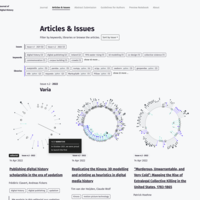Executable papers in the Humanities, or how did we land to the Journal of Digital History
- Track: Open Research Tools and Technology devroom
- Room: UB4.132
- Day: Saturday
- Start: 15:45
- End: 16:00
- Video only: ub4132
- Chat: Join the conversation!

Scientific articles built on executable notebooks are already common in the domain of scientific publication, where they are an effective tool that brings transparency and openness in research communication (FAIR). However, they’re not yet widely praised in the humanities. Luckily, in the digital humanities, Jupyter notebooks play an important role in data analysis and exploration. They provide a free, powerful and open source platform for analyzing text corpora and other datasets in many programming languages - Julia, Python and R; they flawlessly integrate the browsers and many JavaScript data visualization libraries. In general, digital humanists know very well how to make use of Jupyter notebooks to quickly create and share documents containing live code, equations, visualizations, and narrative text. That’s why we naturally decided to work on Jupyter notebooks when we started playing with the idea of funding a Journal for digital historians in conjunction with the publisher DeGruyter. Developed by the C²DH (Luxembourg Centre for Contemporary and Digital History and DeGruyter, the Journal of Digital History (https://journalofdigitalhistory.org) now publishes peer-reviewed, open access articles that are Jupyter notebooks in their essence. With a difference: we wanted authors to reflect on their use of algorithms and digital methods, so we asked them to write their articles as compositions of three layers: narrative, data and hermeneutics. In our presentation we will explore the ecosystem of tools and methods we have prepared together with the authors: GitHub, Docker, MyBinder, Zotero. We will present the process we follow with them from scratch notebooks to published multi-layered, reproducible scientific articles.
Speakers
| Daniele Guido | |
| Elisabeth Guerard |